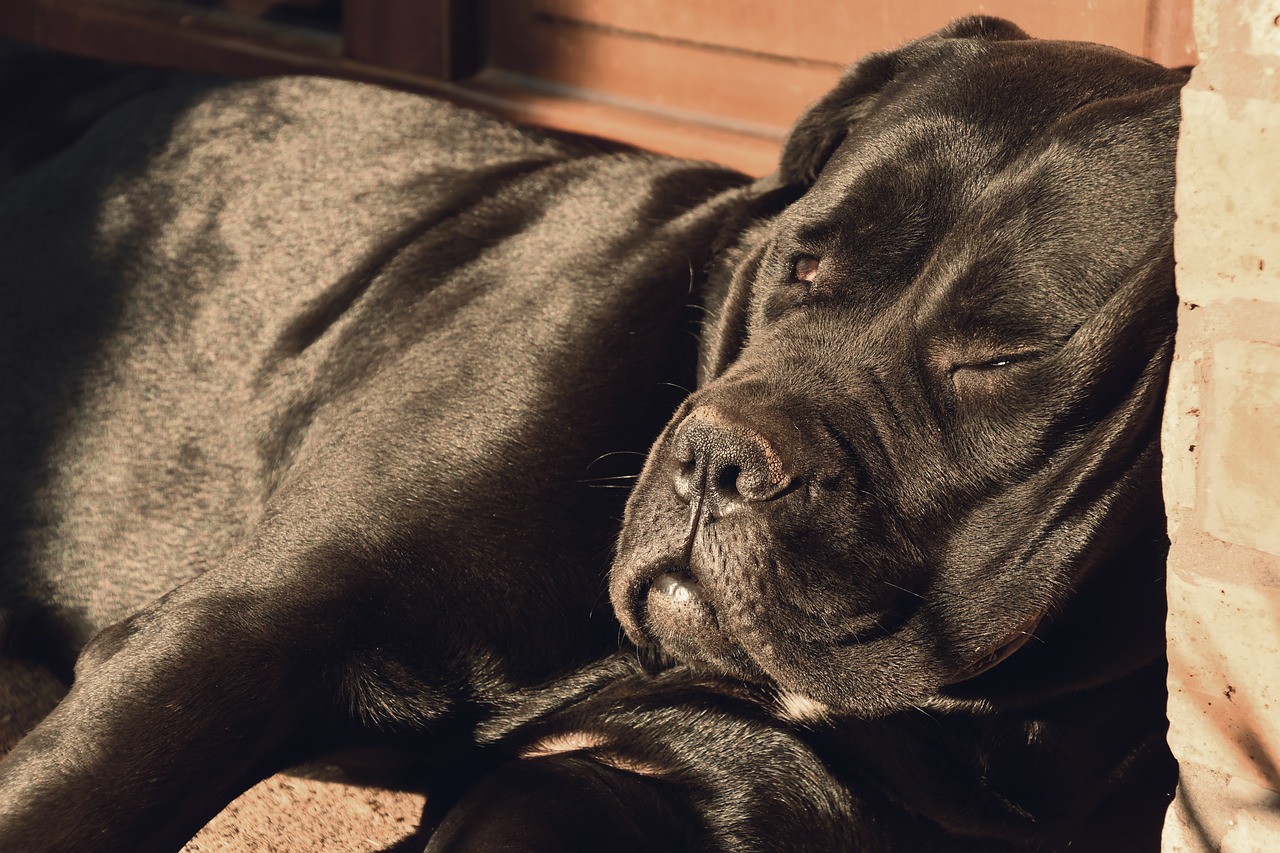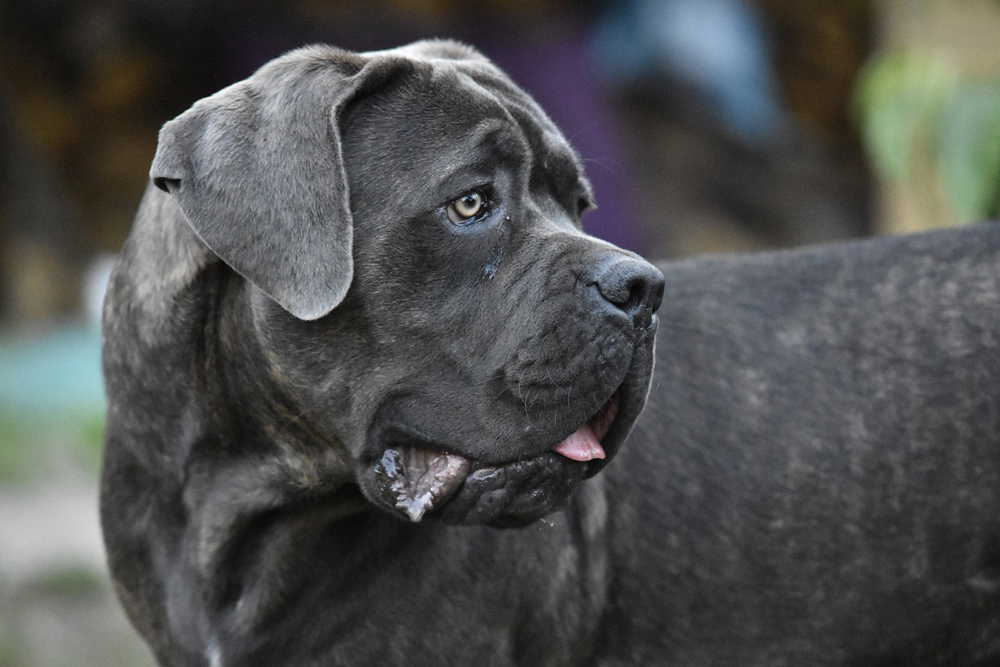Is your cane corso breathing hard? It’s essential to understand the potential causes behind this concerning behavior. Breathing difficulties in dogs, including cane corsos, can indicate various underlying issues that require attention. Whether it’s due to a medical condition, physical exertion, or environmental factors, identifying the cause is crucial for your canine companion’s well-being.
Cane corsos may experience difficulty breathing due to a range of factors. As large and muscular dogs, they can be prone to respiratory issues such as brachycephalic obstructive airway syndrome (BOAS). Additionally, obesity, heart disease, and heat exhaustion can contribute to breathing difficulties. It’s important to consult with a veterinarian to determine the underlying cause and develop an appropriate treatment plan. Remember, prompt action can help alleviate your cane corso’s discomfort and ensure their overall health and happiness.

Why Is My Cane Corso Breathing Hard? Understanding the Causes and Solutions
As a pet owner, it’s essential to be aware of any changes in your canine companion’s health. If you notice your Cane Corso breathing heavily or struggling during normal activities, it’s natural to feel concerned. In this article, we will explore the potential reasons behind why your Cane Corso may be breathing hard and provide some insights into how to address this issue. By understanding the causes and implementing appropriate solutions, you can help ensure the well-being of your beloved pet.
1. Overexertion
One common reason for Cane Corsos to breathe heavily is overexertion. These dogs are known for their athleticism and energy, but excessive exercise or intense physical activity can put a strain on their respiratory system. When your Cane Corso is pushing its limits, it may start panting heavily to regulate its body temperature and ensure sufficient oxygen intake. This behavior is similar to how humans breathe harder after engaging in strenuous exercise.
If you suspect overexertion is the cause of your Cane Corso’s heavy breathing, it’s crucial to allow them to rest and recover in a cool and quiet environment. Ensure they have access to fresh water and monitor their condition closely. Gradually decrease the intensity of their exercise routines and give them time to adjust. However, if heavy breathing persists even with sufficient rest, it is recommended to consult a veterinarian for further evaluation.
2. Heat and humidity
Cane Corsos are prone to heat sensitivity due to their short coat and brachycephalic features. In hot and humid weather conditions, these dogs may struggle to cool down effectively, leading to heavy breathing. Panting is their natural cooling mechanism, but sometimes it may not be enough to regulate their body temperature.
To help your Cane Corso manage their breathing in hot weather, provide them with ample shade and a cool, well-ventilated space. Avoid taking them for walks during the hottest parts of the day and opt for early mornings or evenings instead. Always carry plenty of water and offer frequent opportunities for your pet to drink and cool down. Additionally, consider using cooling vests or mats specifically designed for dogs to help keep them comfortable in warmer temperatures.
In situations where the heat is excessive or your Cane Corso shows signs of heatstroke, such as excessive drooling, lethargy, or vomiting, it is crucial to seek immediate veterinary attention.
3. Obesity
Just like humans, dogs can experience weight-related health issues, including difficulty in breathing. Obesity puts extra pressure on a dog’s respiratory system and can lead to heavy breathing or even respiratory distress. Cane Corsos are at a higher risk of obesity due to their large size and tendency to put on weight easily. Therefore, maintaining a healthy weight is crucial for their overall well-being.
If your Cane Corso is overweight, consult your veterinarian to create a weight loss plan tailored to their needs. This usually involves adjusting their diet, portion sizes, and incorporating regular exercise into their routine. By helping your pet achieve a healthy weight, you can alleviate strain on their respiratory system and improve their overall lung function.
4. Respiratory Conditions
In some cases, heavy breathing in Cane Corsos may be indicative of underlying respiratory conditions. These can include bronchitis, pneumonia, or laryngitis, among others. If your Cane Corso’s heavy breathing persists despite rest and normal environmental conditions, it is essential to consult a veterinarian for a thorough examination and potential diagnostic tests.
The veterinarian will assess your dog’s overall health, listen to their breathing, and may order additional tests such as X-rays or bloodwork to determine the cause of the respiratory distress. Treatment will depend on the specific condition diagnosed, and the veterinarian will develop a plan to manage and alleviate the symptoms to improve your Cane Corso’s respiratory function.
Key Takeaways: Why is my Cane Corso Breathing Hard?
- A Cane Corso may breathe hard due to physical exertion or excitement.
- Excessive panting and heavy breathing can indicate heat exhaustion or overheating.
- Respiratory issues such as allergies, infections, or obstructions could be causing difficulty in breathing.
- Certain medical conditions like heart disease or lung problems can affect a Cane Corso’s breathing.
- If your Cane Corso breathes hard persistently or exhibits other concerning symptoms, it’s best to consult a veterinarian.
Frequently Asked Questions
Is your Cane Corso breathing hard? Find answers to common questions related to this issue.
1. Why does my Cane Corso breathe heavily after exercise?
Cane Corsos are a large and active breed, known for their muscular build and endurance. After exercise, it’s normal for them to breathe heavily as their body works to regulate their temperature and recover from physical exertion. Panting is the primary way dogs cool themselves down, and it’s especially noticeable in breeds like the Cane Corso.
It’s important to pay attention to your dog’s breathing patterns, though. If your Cane Corso is excessively panting, struggling to breathe, or shows signs of distress after exercise, it may be a sign of an underlying health issue. Consulting with a veterinarian is recommended to rule out any respiratory or cardiovascular problems.
2. What could be causing my Cane Corso to breathe heavily when resting?
A Cane Corso breathing heavily when at rest may indicate an underlying health issue, which should be assessed by a veterinarian. Possible causes include respiratory problems like laryngeal paralysis or brachycephalic airway syndrome, as well as conditions affecting the heart or lungs.
If your Cane Corso is overweight or obese, it can also contribute to labored breathing, as excess weight puts strain on the respiratory system. Respiratory infections, allergies, or underlying diseases such as pneumonia or heartworm can also cause heavy breathing. It’s crucial to monitor your dog closely and seek veterinary advice for proper diagnosis and treatment.
3. My Cane Corso breathes heavily during hot weather, is this normal?
It is common for Cane Corsos to breathe heavily in hot weather as they regulate their body temperature through panting. Unlike humans, dogs don’t sweat as effectively, so panting helps them cool down. However, it’s essential to provide your Cane Corso with ample shade, fresh water, and a cool environment during hot weather to prevent overheating.
If your dog shows signs of excessive panting or struggles to breathe in hot weather, it could be a sign of heatstroke. Heatstroke is a medical emergency that requires immediate veterinary attention. Symptoms may include excessive drooling, rapid breathing, lethargy, and vomiting. It’s crucial to cool your dog down gradually and seek professional help as soon as possible.
4. What can I do to help my Cane Corso breathe easier?
To help your Cane Corso breathe easier, it’s important to maintain their overall health and well-being. Regular exercise helps strengthen their respiratory system and keeps them fit. However, avoid excessive exercise that may strain their breathing if they are already showing signs of respiratory distress.
Additionally, keeping them at a healthy weight reduces the strain on their respiratory system. Obesity can lead to various health issues, including difficulty breathing. A balanced diet, regular veterinary check-ups, and keeping your Cane Corso in a clean and smoke-free environment can also contribute to their respiratory health.
5. When should I be concerned about my Cane Corso’s heavy breathing?
If your Cane Corso is experiencing prolonged heavy breathing, especially when it is not related to exercise, it’s important to consult with a veterinarian. Any signs of distress, difficulty breathing, coughing, wheezing, or excessive panting should be taken seriously as they could indicate an underlying health issue. Your veterinarian will be able to assess your dog’s condition, order any necessary tests, and provide the appropriate treatment.

